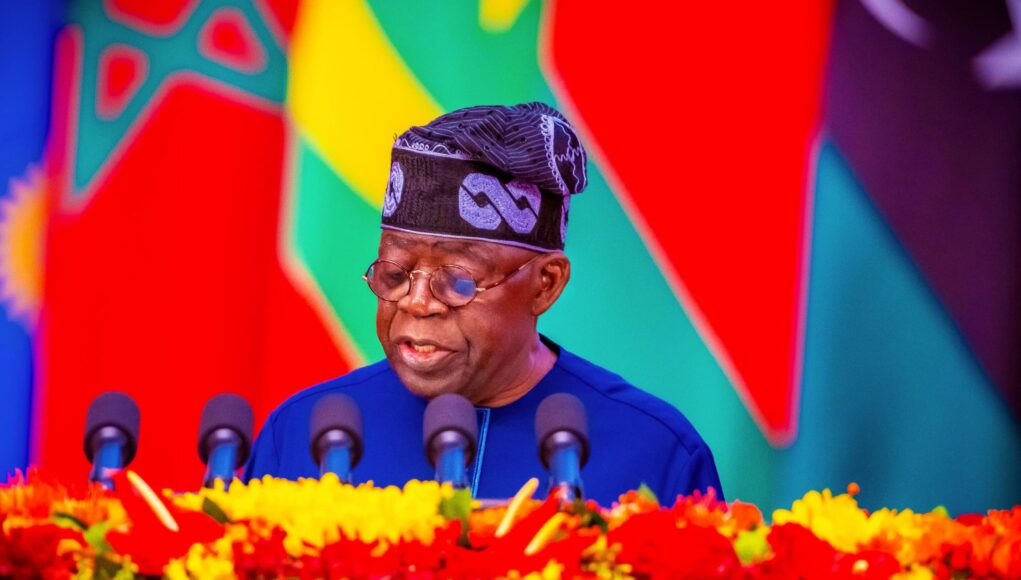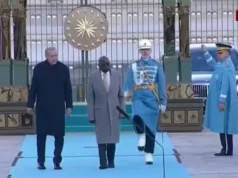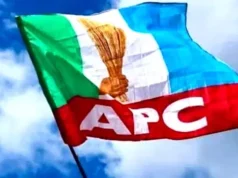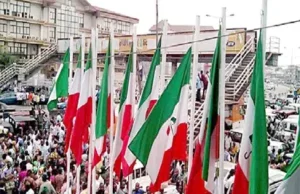President Bola Tinubu defended the four tax reform bills that are presently being considered by the National Assembly.
He insisted that the bills, which have become a subject of heated debates with the North, particularly rejecting them, are aimed at boosting the nation’s revenue.
He emphasised the need for collaboration and not confrontation between the executive and the legislative arms of government to move the nation forward.
Represented by the Director General of the Nigeria Institute of Peace and Conflict Resolution, Dr Joseph Ochoku, the President spoke on Monday in Ibadan at the 7th annual Senator Abiola Ajimobi roundtable and 75th posthumous birthday of the late former governor of Oyo State, held at the University of Ibadan.
The roundtable, organised by the Senator Abiola Ajimobi Foundation in collaboration with the Institute for Peace and Strategies Studies, University of Ibadan, had the topic: “Legislative Oversight in Nigeria: Challenges and Prospects.”
Speaking through Ochoku, the President said, “My administration is determined to forge a harmonious relationship between the executive and the legislative arms of government.
“Despite occasional tensions, we recognise that effective governance is a shared responsibility. Collaboration, not confrontation, must define our interactions as we work towards the collective goal of improving the lives of our people.
“An example of this collaboration is the ongoing deliberation on the four proposed tax bills before the National Assembly.
“These reforms, when enacted, promise to streamline tax administration, enhance revenue generation, and promote equitable resource allocation.
“They are pivotal to our mission of building an inclusive, prosperous, and sustainable Nigeria and making our country competitive to attract foreign direct investment.”
Tinubu said his administration was working to insulate the constitutional roles of each arm of government from primordial sentiments as he expressed belief in press freedom.
“We also believe in press freedom and in holding government accountable. Thus, in our drive to deepen and consolidate the culture of democratic governance, we have been working assiduously to insulate the constitutional roles and functions of each arm of government from primordial sentiments, lack of engagement, and the dissemination of fake news and hate speeches,” he said.
Tinubu lauded the late Ajimobi for leaving a legacy of infrastructural rejuvenation, healthcare delivery, quality education, mechanised agriculture, peace and security as a two-term governor of the state.
“He was a committed party man, with whom we formed the All Progressives Congress in 2013 to pursue people-centric economic growth and development, good governance, transparency, openness, accountability, and inclusivity.
“After serving in the legislative and executive arms of government, Ajimobi served briefly as the acting chairman of the APC before he succumbed to death on June 25, 2020,” he said.
In his remarks, the Deputy President of the Senate, Jibrin Barau, justified the decision of the National Assembly to name its library after President Tinubu.
He also reiterated the commitment of the National Assembly to oversight, describing it as the bedrock of democratic governance.
In a statement by his media aide, Ismael Mudashir, Barau noted that oversight ensures accountability, transparency, and the much-needed checks and balances that enhance the effective use of public funds.
Responding to questions from discussants at the roundtable, he explained the rationale behind naming the National Assembly Library after President Tinubu.
He said, “On the issue of the naming of the National Assembly Library, we decided to do that because we felt that it is the only time in history, the first time in history, that a former senator was elected to lead this country.
“Asiwaju Bola Ahmed Tinubu was a senator, and his wife was a senator. So, we felt these two things that happened in the National Assembly should be appreciated. And so, we decided to name the library after our dear president because of his history as a former senator.”
Barau stressed that the role of legislative oversight in a democratic society could not be overemphasised “because it is the bedrock of democratic governance, ensuring accountability, transparency, and the much-needed checks and balances which enhance the effective use of public funds.”
The Senate Leader, Opeyemi Bamidele, in his address, submitted that effective legislative oversight required close collaboration with the executive.
“In conducting oversight, the principles of cooperative government and intergovernmental relations must be taken into consideration, including the separation of powers and the need for all spheres of government and all organs of state to exercise their functions in a manner that does not encroach on the geographical functional or institutional integrity of government in another sphere.”
Other dignitaries at the event were the National Chairman of the ruling All Progressives Congress, Abdullahi Ganduje; Imo State Governor, Hope Uzodimma; Leader of the House of Representatives, Julius Ihonvbere; former deputy governors of Oyo State, Rauf Olaniyan and Moses Adeyemo; the Oluwo of Iwo, Oba Abdulrasheed Akanbi, among others.









